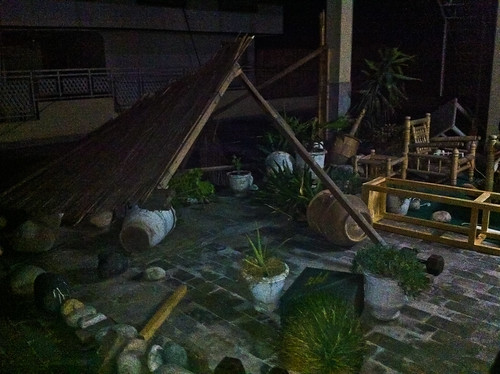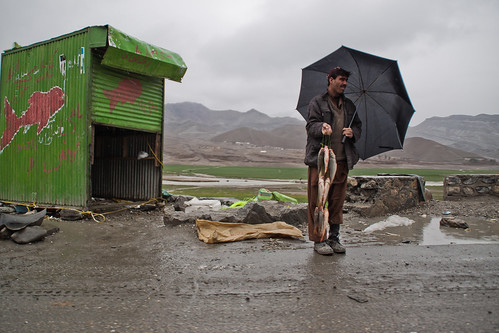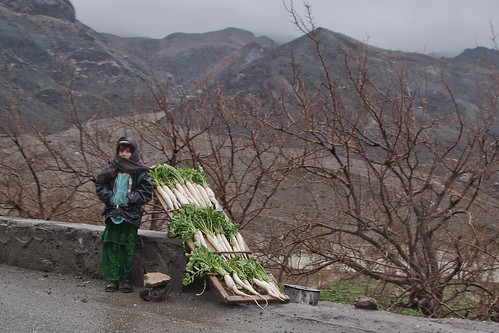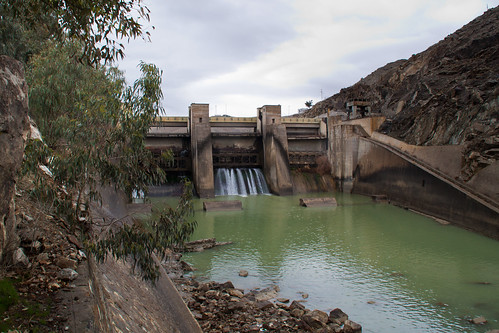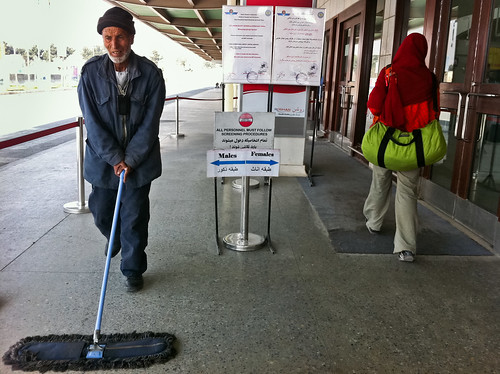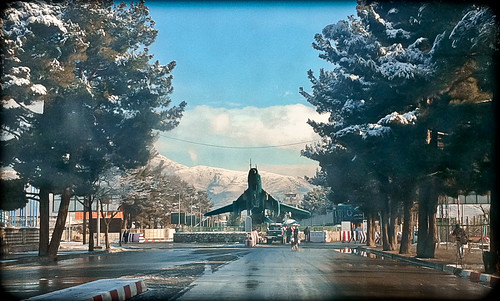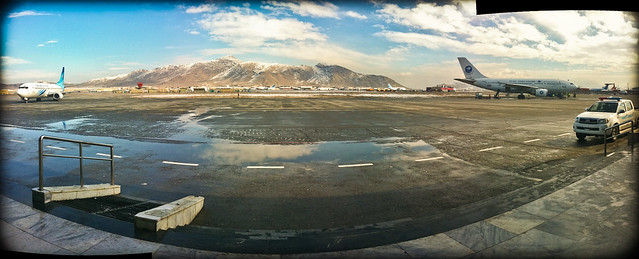Goodbye Jalalabad
The wind picked up on our final morning in Jalalabad. It was soon strong enough that we locked our windows and yet it howled through the cracks. By the early evening the gusts were so strong that they broke windows on the upper deck, broke our deck furniture and knocked over many plants.
We were about to leave Jalalabad, our adopted home, where I spent 1% of my life. Before heading back to San Francisco, we decided to do some in country tourism. The following day was Novruz, the Persian New Year, and we planned to spend it along with 200,000 other pilgrims in the epicenter of the celebration in Mazar-i-Sharif, the capital of the northern Afghan province Balkh which borders Uzbekistan, at the Rowze-e-Sharif Mosque housing the purported Tomb of Hazrat Ali.
Novruz is defined by the Vernal Equinox, which happens when the sun crests across the true celestial equator. Terrestrially we experiencing major shifts as well.
After Lou and I finished packing we huddled together with our coworkers to drink wine and watch the telly (for perhaps the first time.) Bombs were falling in Libiya. Egypt had experienced a coup. Other North African and Middle Eastern countries were undergoing or on the verge of revolutions.
Road to Kabul
I eagerly anticipated a certain photo opportunity on the way out of Jalalabad. Just a few miles west of our compound, near the Darunta dam, I had previously spotted (but failed to photograph) an amusing billboard with a cartoon depiction of a gaggle of bearded Afghan villagers happily handing over a Stinger missile to ISAF forces in exchange for money. No questions were asked. Everyone was smiling.
It was an advertisement for the Stinger buy back program. During the 1980s, the CIA “donated†~2,000 shoulder fired Stinger missiles to Mujaheddin “friendliesâ€. These missiles which could be used to shoot down Soviet helicopters and tanks, had a significant impact in the outcome of the war. The Pakistani intelligence agency ISI had distributed them without much accounting. Consequently, no one knows how many are still floating around. Now the US has budgeted millions to buy back stray missiles for upwards of $100k a piece. It’s cheaper than the consequences. And this creates an interesting economic valuation climate for weapons. How much is your enemy willing to pay you not to shoot at them? The “ransom priceâ€.
On the way out of town, we noticed that many of the billboards had been knocked down by the wind. Just yesterday, they were still covered with election posters six months past their due. I had wondered just when they’d be taken down and by whom. The billboards that hadn’t collapsed entirely stood warped and bare, picked clean by the sand blasts of wind.
The road to Kabul follows the course of the Kabul river, winding its way along the southern bank through hills, past three partially functioning and eternally under-repair dams, and finally up a narrow, dangerous, serpentine gorge locally known as Mohi Par (fish’s tail).
The road is dotted with makeshift shacks selling the available bounty of the land. Today men waved reams of river fish and kids shook bunches of mountain vegetables at oncoming traffic.
We passed a couple fuel tankers, a favorite target for IEDs, Their rusty tanks were leaking fuel right on the road.
Next we encountered an oncoming Afghan National Army supply convoy. Unlike ISAF convoys that drive slow and flock together, ANA seems engaged in a race with each behemoth for itself swerving around the curves.
Remarkably, right before our eyes a large container flew off the back of one of the trucks, bounced on the road, and spilled its booty of ANA uniforms onto the road.
- “Stop,†I yell to our driver Najib. I sense a really epic souvenir pickup. Gotta get this one quick. He skids to a halt, but so does the car behind us. Other people have the same idea. I run towards the uniforms and so does the grey bearded Afghan from the second car.
But before we’re able to snag the uniforms, the next truck in the convoy rounds the corner, stops in the middle of the road. Soldiers hop out with their rifles and stare us down.
“Alright, you win. You can have your uniforms.†I go back to the car with my heart pounding. Damn, it was close.
Face to Face
The motto “every car for itself†applies to every vehicle on the road. They swerve onto oncoming traffic trying to eek out ever more lanes out of two. If it wasn’t so dangerous their optimism would almost be laudable.
The one way I can explain it is that they are making a rational calculation where the variable that is drastically different from my own valuation is the value of one’s own life.
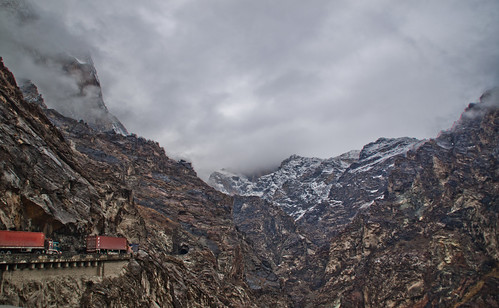
“This didn’t happen during the time of the Taliban,†said Najib. “Everyone knew their lane and what would happen if you veered outside of it.†(Of course, there were also fewer cars.)
Now what you get is a lot of avoidable gridlock. They call it glibly “face to faceâ€. It sounds nice. Sorry we were 5 hours late, “we had some face to face on the road.†And everyone understands that what is meant by this is that cars piled up for miles on a two lane road face to face without any room to maneuver. It takes a lot of coordination to clear such a mess. Eventually, somehow, with guns waiving in the air, we drove out of it.
Kabul
There was one errand left to run in Kabul. Â We needed to purchase a few point to point antennas so we headed to the computer shopping district. Â A man with a riffle walked into the store and pointed it at the shopkeeper. Â After a few seconds it became clear it was a joke. Â Ha, ha, Afghanistan.
We dropped our stuff at Una’s (the newest member of SSF but quite a veteran for an expat in Kabul) and headed out for dinner with a couple of her journalist friends.
One of the journalists, Omar Malick had just completed a documentary in Pakistan and come out to work for Basetrack.org a Knight Foundation Grantee that used Facebook to report on 1/8 Marines deployment in Kandahar. He was now straded since the military chose to terminate this experiment. Omar had instead thrown himself into iPhone hipstamatic photography and shared some amazing shots over Thai food.
Together we roved to a Novruz party at a compound of an Afghan “consulting†firm where the spread resembled that of an American college dorm party. Beers were stacked in a pyramid. Chips, salsa and munchies for appetizer. “Pizza is on the way.â€
The hosts asked us to “not be too loud and disturb the fundamentalist family that lives next door†as “they might do something about it.â€
The attendees were Afghan staff of NGOs, the UN, or various government ministries. Think of it like an Afghan beltway crowd.
The guests and employees alike were mostly educated at liberal arts colleges in the West and unanimously felt like American money was being thrown at them to try to solve the “Afghan problemâ€. Jokes around the camp fire revolved around writing impact reports and USAID proposals for firewood, which was running low.
“Afghanistan is where the money is at. For educated Afghans and for security contractors, that’s the best windfall. Where else can twenty year old boys and girls consult governments [by the seat of their pants, sometimes by just being the eyes that read on behalf of the illiterate]?â€
There was a rumor about the possibility of fireworks for Novruz so we ascended to the roof. After the countdown to midnight, nothing but the scent of Hindu Kush and gentle giggles was heard.
Airport
An early morning “Hope Taxi†gots us to the Airport. Six chambers of security, each with a male and female line, neither more secure that the last, and we’re in the main hall.
We have a Pamir Airways e‑ticket to Mazar-i-Sharif for three people. We’re happy to have Najib along. We’ve become so close and these are our last four days together. Because of the holiday the airport is crowded more than usual.
We check in at the only counter that says Mazar, even though it actually seems like a different airline. Bags are checked, paper tickets issued, no hitch.
Through another tier of security we find ourselves resting in the waiting lounge.
Out of the corner of my eye, I spot the airline employee who checked us in with a look of consternation. He’s clearly looking for somebody. He’s heading straight for us!
Evidently the Pamir fleet was grounded as part of a general Kabul Bank lending practice shake down and the airline’s inability to repay a shady $98 million loan. The airline was shut down two days before our flight. We saw Pamir planes parked at the airport. Ironically, their online ticket sales website is still running, while we are still out $900+ for our flights.
He explains to us that we had purchased tickets for an airline that ceased to exist by the time we got to the airport. He had mistakenly issued us tickets and now insists we actually pay for them to get on the flight.
Naturally we protest, but as absurd as it is, it was also clear that he was speaking the truth. No, he didn’t know how we would go about getting a refund from Pamir, but then again, neither did the many other people who were in the same situation that we were.
We paid and boarded.
To be continued …


